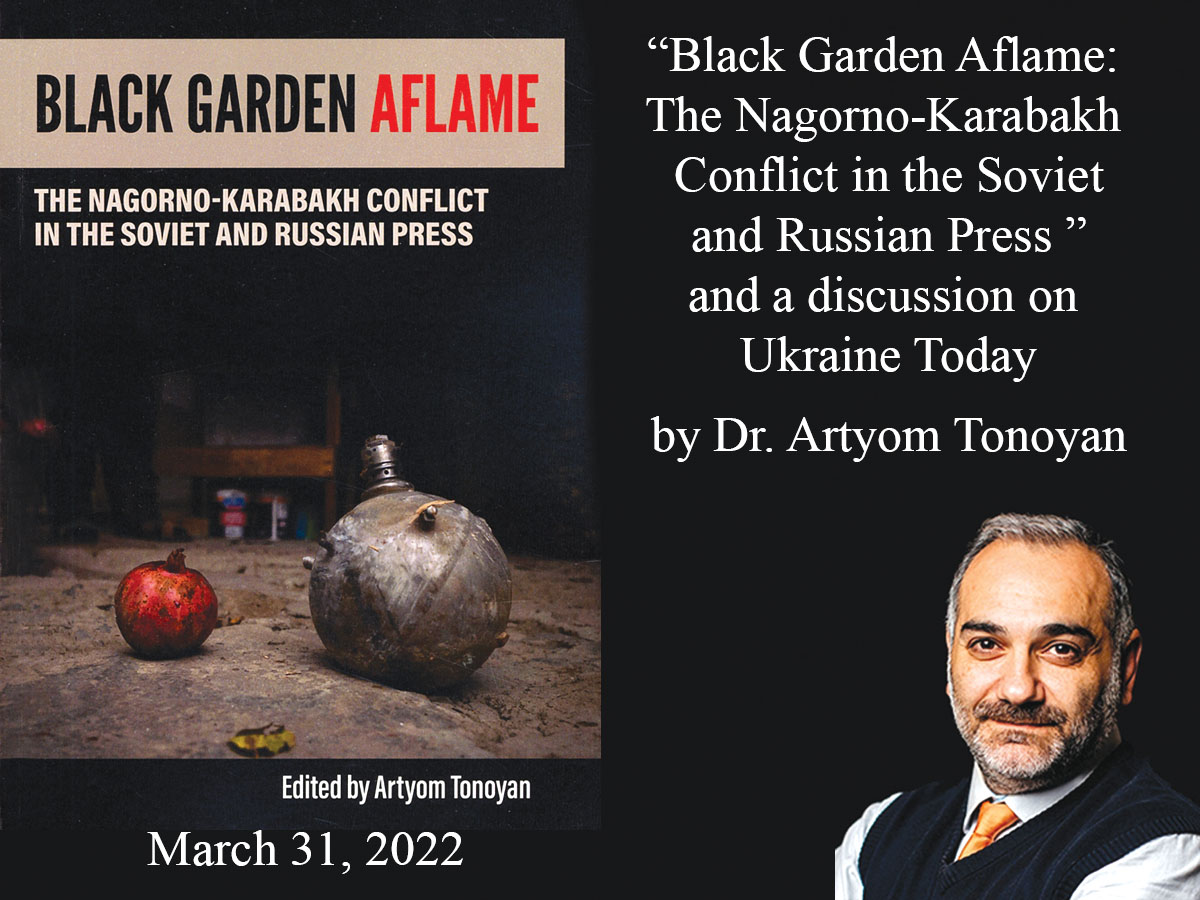
Eddy Thurber
Staff Writer
On Thursday, March 31, 2022, the Armenian Studies Program had the honor of hosting Dr. Artyom Tonoyan for a Zoom webinar on “Black Garden Aflame: The Nagorno-Karabagh Conflict in the Soviet and Russian Press.” A sociologist by training, Dr. Tonoyan focuses on researching the intersection between religion and nationalism in Russia and the Caucasus. He received his Ph.D. from Baylor University, and presently guest edits the Journal of Law and Religion for an upcoming symposium on religion and law in Russia.
Armenian Studies Program Director Prof. Barlow Der Mugrdechian introduced Dr. Tonoyan to the audience. Dr. Tonoyan began by thanking the Program, Prof. Der Mugrdechian, and Dr. Sergio La Porta, for facilitating this event and inviting him. He spoke for nearly an hour, lecturing and answering questions from his audience as well as discussing his inspiration for writing his new book, Black Garden Aflame.
During the Artsakh War, in September of 2020, there was a ten-day silence on the subject from Russian President Vladimir Putin. This silence amid the war, numerous mutual defense agreements between Armenia and Russia, and the response of shock from the diaspora and Armenian Republic led Dr. Tonoyan to the realization that perhaps the understanding of Armenians toward the Kremlin was not only incomplete, but nonexistent. Dr. Tonoyan decided to begin research on over 30 years of Russian language articles and literature to analyze Putin and the Kremlin and to better understand their modern stance on conflicts and geopolitics.
Aside from tourism or war, the South Caucasus rarely enters the consciousness of the global West, but Russian coverage is extensive and intimate. Dr. Tonoyan began to explore why this was, and why in various cases Russia supported Yerevan or Baku, while always looking out for their own best interests. Another primary motivation for Dr. Tonoyan was that it is very difficult to find physical or digital primary sources from Russia, and so by doing the legwork and compiling his research into this book, he could make all these resources available in one condensed form for future research.
Dr. Tonoyan compiled over 400 articles on the Nagorno-Karabagh conflict, organizing them chronologically, and dividing them into three sections. The first was the entrance of the conflict into the Russian and Soviet Press in 1987 during the first conflict, prior to Sumgait, and the mass demonstrations of 1988. Part two involved the violence and conflicts from the Sumgait massacres, segueing into the broader international coverage of the conflict as the Soviet Union collapsed. He also covered the conflict as it morphed from internal strife and guerilla warfare between two Soviet republics to war between two independent nations, Armenia and Azerbaijan, and their armies over the semi-autonomous region of Artsakh. Part three focuses on how four inter-regional actors try to involve themselves and benefit from this conflict, namely Russia, Turkey, Iran, and the United States.
One interesting factor was the consistency with which Russia advocated for an equitable solution with no clear winner or loser, making pronouncements that support either party. Turkey’s position, on the other hand, changed dramatically from Ankara’s stance in the first conflict of never supplying weapons to Azerbaijan, and promoting a peaceful solution.
Dr. Tonoyan then turned to a brief analysis of the war in Ukraine, based on his extensive history living in, researching about, and personal connections to Ukraine. Dr. Tonoyan predicted that this conflict would produce further struggles between Azerbaijan and Armenia, as Azerbaijan uses the events in Ukraine as cover to provoke Armenia further. “Aliyev’s timing,” Dr. Tonoyan stated, “was perfect.” Aliyev took full advantage of geopolitical events to act. He even met with Putin the day before the conflict, drinking with him and signing a treaty to build rapport with the Russian President. Seeing Russia distracted internationally, Aliyev saw an opportunity to escalate the conflict as he has in the past several months, including cutting off the supply of heating oil to Artsakh.
Dr. Tonoyan concluded his presentation by answering questions from the Zoom audience. One question was to what extent can blame be placed on Stalin for this war going back to the formation and policies of the Soviet Union. Dr. Tonoyan answered by saying that the Russian media did not provide much coverage of this issue, but that the consensus was that Stalin’s Glasnost and Perestroika policies created a ticking time bomb which was never defused and eventually exploded into the Artsakh conflict.
The Armenian Studies Pro-gram thanks Dr. Tonoyan for sharing the story and inspiration of his book Black Garden Aflame: The Nagorno-Karabakh Conflict in the Soviet and Russian Press and presenting his thoughts on the current conflict in Ukraine and how it relates to Artsakh and the conflict between Baku and Yerevan.
 Hye Sharzhoom Armenian Action
Hye Sharzhoom Armenian Action